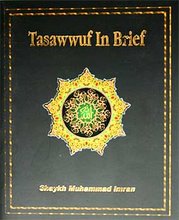
Tuesday 25 September 2007
Thursday 20 September 2007
Dua at the time of Iftar
“And when My servants ask you about Me, of course, I am near. I respond to the call of one when he prays to Me; so they should respond to Me, and have faith in Me so that they may be on the right path”. (2:186)
The previous verses mentioned the merits and injunctions concerning fasting and Ramadan. This strain continues even after the present verse. In between, this brief verse has been introduced to persuade servants of Allah to pray before Allah.
Ibn Kathir has pointed out that this verse appearing in the middle of injunctions of fasting is a hint that prayer (dua) made at the completion of a fast is accepted, therefore, one should be very particular about making dua at that time. In a Hadith it has been mentioned,
The previous verses mentioned the merits and injunctions concerning fasting and Ramadan. This strain continues even after the present verse. In between, this brief verse has been introduced to persuade servants of Allah to pray before Allah.
Ibn Kathir has pointed out that this verse appearing in the middle of injunctions of fasting is a hint that prayer (dua) made at the completion of a fast is accepted, therefore, one should be very particular about making dua at that time. In a Hadith it has been mentioned,
للصائم عند فطره دعوة مستجابة
“ The prayer made by one who is fasting at the time of his iftar is accepted".
This is why the blessed Companion, Abdullah ibn Umar would assemble his family members around him at the time of iftar and would make dua.
Wednesday 19 September 2007
The Human Self (Nafs)
Within our body there is our Nafs (self). Allamah Alusee (ra) mentions regarding Nafs: “the nafs (self) by its nature is very inclined to passions (shahwaat)”.
There is well known story of Abu Yazid Bustami (ra). When he saw Allah Subhanahu Wata’ala in a dream, he asked Him: “How can I find the way to you?” Allah said: “Abandon yourself and come!” Thus all good lies in waging total war against the Nafs (self) under all circumstances.
The Qur’an also tells us about the inclinations of human soul that have direct bearing on the levels of development.
One is the inclination towards doing wrong and evil deeds, termed as Nafs-i-Ammarah (12:53).
The other is towards realization and repentance i.e. to realize immediately if one does something wrong, that what he has done is termed as Nafs-i-Lowwamah (75:2).
The third is towards doing good and righteous deeds, termed as Nafs-i-Mutmainnah (89:27)
In a Hadith in which the Holy Prophet Sallalahu Alaihe Wasallam has been reported to have asked the Sahahbah Radiallahu Anhum: What do you think about a companion who, if you treat him nicely, feed him, clothe him, still he would throw you in all sorts of troubles, and if you insult him, and keep him hungry and naked, he would do what is good for you? The Sahabah said: Ya Rasulullah, there just cannot be a companion worse than him in this whole world! He said: By Him in whose hands rest my life, your self inside you is such a companion. (al-Qurtubi) and it appears in another Hadith: Your greatest enemy is your own self which not only disgraces you by getting you involved in evil deeds, but also makes you run into all sorts of troubles.
However, the aforementioned Verses and Ahadith narrations tells us, that human self does usually demand the taming of what is bad from us.
To explain, it can be said that the human self when on its own does incite to evil deeds is called Ammarah (it directs its owner towards every wrong action). But, when one does not follow its passions because of the fear of Allah, his or her self becomes Lawwamah (the self, which is conscious of its own imperfections and blames its own wrong doings and evil deeds, and repents from them and seeks forgiveness). When someone keeps striving hard against passions of his or her self, and brings it to a state where the very urge to commit evil deeds does not remain there anymore, then, that self becomes what is called Mutma’innah (the self at peace). Righteous people can be at this state through spiritual strivings.
Hadhrat Shaykh Maulana Anver Shah Saheb writes: “the self of a human is first absorbed in passions and futile things, never inclining to virtue or good deeds, such self is called Ammarah. Then, somewhat it come to senses and understood good and bad, and so desisted; sometimes in heedlessness ran on his or her original habit where after sense touched him or her and began to rebuke him or her self, such a self is called reproachful- Lawwamah. Then when it completely becomes purified and the inclination of self, remains on virtue, it starts to flee from absurd action by itself, and feel pain at the very thought of committing evil, this self becomes peaceful – Mutmainnah”.
In order to attain the desirable level of development, Nafs lawwamah and Nafs Mutmainnah have to be activated and Nafs Ammarah has to be suppressed or controlled to a desirable extent if not to be completely suppressed.
There is well known story of Abu Yazid Bustami (ra). When he saw Allah Subhanahu Wata’ala in a dream, he asked Him: “How can I find the way to you?” Allah said: “Abandon yourself and come!” Thus all good lies in waging total war against the Nafs (self) under all circumstances.
The Qur’an also tells us about the inclinations of human soul that have direct bearing on the levels of development.
One is the inclination towards doing wrong and evil deeds, termed as Nafs-i-Ammarah (12:53).
The other is towards realization and repentance i.e. to realize immediately if one does something wrong, that what he has done is termed as Nafs-i-Lowwamah (75:2).
The third is towards doing good and righteous deeds, termed as Nafs-i-Mutmainnah (89:27)
In a Hadith in which the Holy Prophet Sallalahu Alaihe Wasallam has been reported to have asked the Sahahbah Radiallahu Anhum: What do you think about a companion who, if you treat him nicely, feed him, clothe him, still he would throw you in all sorts of troubles, and if you insult him, and keep him hungry and naked, he would do what is good for you? The Sahabah said: Ya Rasulullah, there just cannot be a companion worse than him in this whole world! He said: By Him in whose hands rest my life, your self inside you is such a companion. (al-Qurtubi) and it appears in another Hadith: Your greatest enemy is your own self which not only disgraces you by getting you involved in evil deeds, but also makes you run into all sorts of troubles.
However, the aforementioned Verses and Ahadith narrations tells us, that human self does usually demand the taming of what is bad from us.
To explain, it can be said that the human self when on its own does incite to evil deeds is called Ammarah (it directs its owner towards every wrong action). But, when one does not follow its passions because of the fear of Allah, his or her self becomes Lawwamah (the self, which is conscious of its own imperfections and blames its own wrong doings and evil deeds, and repents from them and seeks forgiveness). When someone keeps striving hard against passions of his or her self, and brings it to a state where the very urge to commit evil deeds does not remain there anymore, then, that self becomes what is called Mutma’innah (the self at peace). Righteous people can be at this state through spiritual strivings.
Hadhrat Shaykh Maulana Anver Shah Saheb writes: “the self of a human is first absorbed in passions and futile things, never inclining to virtue or good deeds, such self is called Ammarah. Then, somewhat it come to senses and understood good and bad, and so desisted; sometimes in heedlessness ran on his or her original habit where after sense touched him or her and began to rebuke him or her self, such a self is called reproachful- Lawwamah. Then when it completely becomes purified and the inclination of self, remains on virtue, it starts to flee from absurd action by itself, and feel pain at the very thought of committing evil, this self becomes peaceful – Mutmainnah”.
In order to attain the desirable level of development, Nafs lawwamah and Nafs Mutmainnah have to be activated and Nafs Ammarah has to be suppressed or controlled to a desirable extent if not to be completely suppressed.
A person would repent over whatever wrong he does and vow not to do any wrong again only when his Nafs Lawwamah is activated and Nafs Ammarah is suppressed or controlled.
Repentance in this context involves two things. One is the activation of Nafs Lawwamah because the person realizes his fault or mistake and rebukes him or her self for it. The other is the suppression of Nafs Ammarah because repentance involves not merely the expression of regret over the wrong done but also firm determination of not doing any wrong again which implies nothing but suppression of Nafs Ammarah. Repentance without solemnly undertaking not to repeat any wrong cannot be treated as repentance. Likewise, a person is impelled to do righteous deeds only when his Nafs Mutmainnah is activated.
In other words, Nafs Ammarah has to be controlled to avoid the commission of major sins at least if it is not possible to avoid the commission of all the sins. The Qur’an treats the persons avoiding the worst of sins, if not all the sins, as being rightly guided (42:37).
Repentance in this context involves two things. One is the activation of Nafs Lawwamah because the person realizes his fault or mistake and rebukes him or her self for it. The other is the suppression of Nafs Ammarah because repentance involves not merely the expression of regret over the wrong done but also firm determination of not doing any wrong again which implies nothing but suppression of Nafs Ammarah. Repentance without solemnly undertaking not to repeat any wrong cannot be treated as repentance. Likewise, a person is impelled to do righteous deeds only when his Nafs Mutmainnah is activated.
In other words, Nafs Ammarah has to be controlled to avoid the commission of major sins at least if it is not possible to avoid the commission of all the sins. The Qur’an treats the persons avoiding the worst of sins, if not all the sins, as being rightly guided (42:37).
The use of appropriate method coupled with guidance and the fear of Allah on the one hand and firm faith in the Mercy and Magnanimity of Allah, on the other, could be of great help in activating Nafs Lawwamah and Nafs Mutmainnah. (Insha-Allah)
With will, fire becomes sweet water;
and without will, even water becomes fire. (Mathnawi)
By: my respected teacher hafezahullah.......
With will, fire becomes sweet water;
and without will, even water becomes fire. (Mathnawi)
By: my respected teacher hafezahullah.......
A company of the pious
A Musalee (one who goes to a Mosque) wrote a letter to the editor of a newspaper and complained that it made no sense to go to Mosque. "I've gone for 30 years now," he wrote, "and in that time I have heard something like 3,000 Lectures. But for the life of me, I can't remember a single one of them. So, I think I'm wasting my time and the Imams are wasting theirs by giving Lectures at all." This started a real controversy in the "Letters to the Editor" column, much to the delight of the editor. It went on for weeks until someone wrote this clincher, I've been married for 30 years now. In that time my wife has cooked some 32,000 meals. But for the life of me, I cannot recall the entire menu for a single one of those meals. But I do know this: They all nourished me and gave me the strength I needed to do my work. If my wife had not given me these meals, I would be physically dead today. Likewise, if I had not gone to Mosque for nourishment, I would be spiritually dead today.
By: my respected teacher hafezahullah.......
Thursday 13 September 2007
Week 4 and 5
HADITH:
"Moderation in spending is half of one's sustenance, friendliness towards people is half of one's intelligence, and asking good questions is half of one's knowledge" (Bayhaqi, Shu'ab al-Iman)
DID YOU KNOW:
There were ten companions promised Paradise by the prophet Muhammed 9sallahu alaihi wassalam) during their lifetimes. These were: Abu bakr, Umar, Uthman, Ali, Talha, Az-Zubayr, Abdur-Rahman bin Awf, Sa'd Ibn Abi Waqqas, Sa'id bin Zayd and Abu Ubayda Ibn al-Jarrah.
TARGET:
Try to enjoin the good in people.
"Moderation in spending is half of one's sustenance, friendliness towards people is half of one's intelligence, and asking good questions is half of one's knowledge" (Bayhaqi, Shu'ab al-Iman)
DID YOU KNOW:
There were ten companions promised Paradise by the prophet Muhammed 9sallahu alaihi wassalam) during their lifetimes. These were: Abu bakr, Umar, Uthman, Ali, Talha, Az-Zubayr, Abdur-Rahman bin Awf, Sa'd Ibn Abi Waqqas, Sa'id bin Zayd and Abu Ubayda Ibn al-Jarrah.
TARGET:
Try to enjoin the good in people.
Poetry
COME, BEGGARS
Come, beggars
sit with open hands
at the gate
of nothingness
God will bring bread
without the mdium
of bread
sweetness
without honey or bee
when past and future
dissolve
there is only you
senseless as a lute
upon the breast of God
Come, beggars
sit with open hands
at the gate
of nothingness
God will bring bread
without the mdium
of bread
sweetness
without honey or bee
when past and future
dissolve
there is only you
senseless as a lute
upon the breast of God
(Rumi)
Subscribe to:
Posts (Atom)



